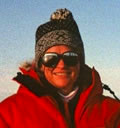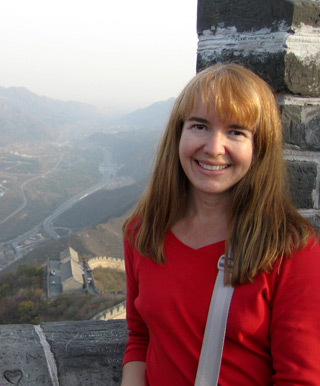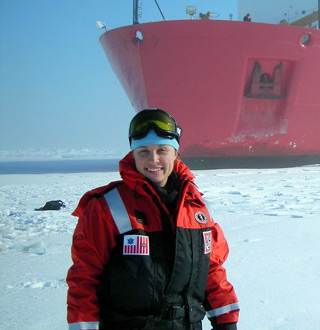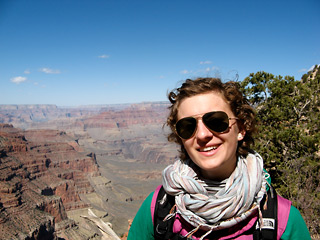Meet the Krill Team
Krill are like tiny shrimp. The krill team is looking at how changes in sea ice affect krill, particularly what they eat and how much they reproduce. They’re looking at differences between seasons and over multiple years. You have to understand krill if you want to understand how climate change will affect the fisheries – krill are a big part of the diet of commercially important fish. The krill team will use plankton nets to catch krill and the CTD to measure physical properties of the water. They will also make measurements on the ice and grow krill in incubators on deck.
 Evelyn Lessard
Evelyn Lessard
Co-Chief Scientist
University of Washington
What is your role in the expedition?
I am a principal investigator on the project. I am working with my colleague, Rodger Harvey, and our ‘Krill Gang’ to determine what krill are feeding on in different environments (under sea-ice and in open water) and different seasons (spring and summer). We are combining two approaches: direct assessment of feeding on the natural suite of prey (algae, protozoa, copepods) in bottle experiments, and measuring different types of lipids that the krill acquire when feeding on different prey. We are also measuring the growth and egg production rates of the krill, so that we can figure out how well they are doing under different ice-cover conditions.
Why did you choose science as a career?
As a kid, I had a wide variety of interests; I loved reading books, doing art and observing the natural world. I liked science as a subject, but I didn’t really know what a scientist DID. It wasn’t until college, when I had a really inspiring Biology teacher that I was truly turned on to the practice of science. My professor was working on the up-and-coming field of marine microbiology, and he asked me to work on a project one summer. I became fascinated with the microbial world and went on to do an independent senior project under this professor. I realized, though, that I didn’t want to be confined to working in a windowless laboratory, so Oceanography was perfect for me - a field that combined science and ocean-going adventures and travel.
Where did you grow up?
I grew up in Connecticut, did my undergraduate work at Middlebury College in Vermont, and got my graduate degree in Oceanography at the University of Rhode Island. I am now on the faculty at the University of Washington. I love living in the Pacific Northwest, but if I could live in two places at once, the other would be Vermont, my favorite place on earth (if only they had an ocean…).
What were your favorite and least favorite things about high school/college?
I most enjoyed my biology and art courses. I have always been drawn to art as well as science, as I think both pursuits combine passion and creativity.
 Tracy Shaw
Tracy Shaw
Technician
Oregon State University
What is your role in the expedition?
I am part of the team studying euphausiid (krill) grazing (with Evelyn Lessard), and I will also be doing experiments to measure the growth rates and brood sizes of krill.
Why did you choose science as a career?
I was always curious about animals, particularly about how they behaved. I grew up next to the ocean and was always fascinated by the animals I found living on the rocks and in the tidepools at the beach. Like many before me, I initially wanted to study whales until my college Invertebrate Zoology class introduced me to the world of tiny creatures that populate the ocean. I didn't specifically decide to study krill; I just happened into it after volunteering on a research cruise in Antarctica.
Where did you grow up?
Santa Barbara, California.
What were your favorite and least favorite things about high school/college?
In college I liked that classes that dealt with animal behavior and with specific groups of animals - mammals, birds, invertebrates, insects, etc. These classes also included field trips where we would travel to the mountains to look for pikas or to the ocean to go out on a boat. I really enjoyed the travel that was a part of those classes - and still enjoy the travels I get to do for work. My least favorite subjects were calculus and chemistry. Luckily for me, not all science jobs require an extensive understanding of these subjects.
 Megan Bernhardt
Megan Bernhardt
Technician
University of Washington
What is your role in the expedition?
I am part of the 'Krill Gang' and in particular, studying what krill are eating in the Bering Sea during the spring and summer. I will help conduct onboard experiments where we place krill in bottles with their food, microscopic phytoplankton and microzooplankton, and take water samples before and after the experiment. I will then take these samples back to the lab where all the food will be counted under a microscope.
Why did you choose science as a career?
During my undergraduate studies I had a quarter without a math or a science class. About halfway through that quarter I started to miss having a science class! I knew then that I should major in one of the sciences.
Where did you grow up?
I grew up in Marysville, Washington and now live in Seattle. I can't imagine living anywhere that isn't close to the ocean!
What were your favorite and least favorite things about high school/college?
I really enjoyed my undergraduate experience at the University of Washington in the oceanography program. The program is geared to prepare you for hands on science culminating with a senior project. During this project, you plan all aspects of your own research, conduct the research on a week long cruise, analyze the data, write up your results and give a presentation. It's a lot of hard work but a rewarding and memorable experience.
 Virginia Engel
Virginia Engel
Graduate Student
University of Washington
What is your role in the expedition?
I'm a graduate student at the University of Washington. I'll be studying krill feeding and isolating protists on this cruise.
Why did you choose science as a career?
Science has always been my favorite subject in school. I thought I wanted to be a doctor until midway through college when I did a semester with the Sea Education Association. After doing oceanographic research at sea, I was hooked.
Where did you grow up?
I grew up in Wisconsin, went to college in New York, and now I live in Seattle, WA.
What were your favorite and least favorite things about high school/college?
I like looking back on high school and college and recognizing the moments that my interests and understanding developed. For instance, freshman year of high school, I realized that biology was the science for me when we had to dissect a fetal pig. I felt bad for the poor piglet, but as soon as we began, I loved it. I've been a biologist ever since.
More Krill Team coming...
Rodger Harvey
Scientist
University of Maryland
Rachel Pleuthner
Technician
University of Maryland


